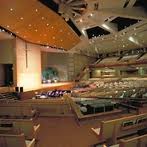
One of the possibly unintended consequences of the megachurch phenomenon is that there are now all these huge air-conditioned, sound system-equipped auditoriums available for rental by public school departments for the purpose of holdinng graduation ceremonies. And some have availed themselves of the facilities, as night follows day there have been lawsuits challenging the practice as a violation of the First Amendment's ban on religious establishments. The latest news for the challengers has been good.
In Connecticut, where the two high schools in Enfield have for the past decade been using Bloomfield's First Cathedral (formerly known as First Baptist of Hartford), the school board voted last week to settle a case brought by the ACLU and Americans United–agreeing to stop the practice. What happened was that in last November's elections, Democrats became a majority on the school board and decided to reverse a pretty transparent effort on the part of some zealous Republicans to make a religious statement. It look like what took them so long was working out the legal costs, which the zealous folks at the American Center for Law and Justice, which had been defending the town, originally said they'd cover.
Next came an en banc decision by the Seventh Circuit Court of Appeals, declaring unconsitutional a similar deal whereby the high schools in the Elmbrook School District near Milwaukee had though much of the past decade held their graduations in nearby Elmbrook Church. The seven-member majority decision found that this “necessarily conveys a message of endorsement” of religion. The case was a closer call than Enfield, I'd say, because there was no evidence that the school board was doing anything else than finding a venue that worked. And yet there was good evidence that the folks at the church were interested iin using the occasion to do some proselytizing.
Since the graduations have been held in a new field house for the past three years, it's not clear to me why the district would continue to pursue the case–unless, of course, their zealous lawyers say they'll stick them with the bill if they don't. If the Seventh Circuit decision is appealed, though, I wouldn't be at all surprised if the Supreme Court takes this case on. The court has never delivered an opinion on the constitutionality of public school graduations in religious sanctuaries (as distinct from officially sanctioned graduation prayers).
Looking forward to what would doubtless be another classic occasion for culture-war contention, the mischievous Judge Richard Posner concluded his dissent with the following reflection:
The great David Hume favored established churches on the ground that monopoly breeds indolence, and so an established church would dampen religious strife. Until the Schempp decision in 1963 prayer was common in public schools in many parts of this country, yet religion had less salience in the public sphere than it has today. Separation rulings by the Supreme Court seem only to stimulate religious fervor. Religions thrive on persecution, real or imagined. Where would Christianity be without its martyrs? The real winner of this case is likely to be—Elmbrook Church.
That's an obvious swipe at the ACLU and it's kind but a more suble one at the other side as well. What passes for religious persecution in the U.S. today doesn't amount to much. You figure those who are doing their best to imagine it know exactly what they're doing.




